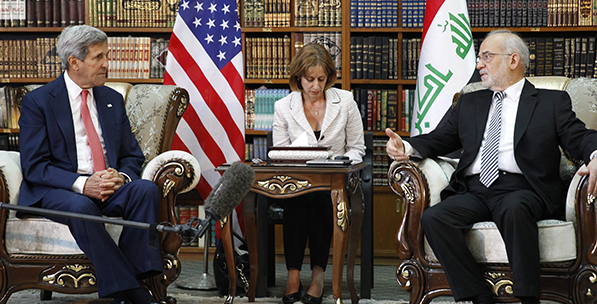No longer able to handle mounting criticism, U.S. President Barack Obama has announced a road map to fight the Islamic State of Iraq and al-Sham (ISIS) on Wednesday, Sept. 10. His speech signaled that prolonged military action will be necessary to restore some order to the Middle East, which will involve the formation of a U.S.-led international coalition but with no American boots on the ground. The Obama administration's strategy to weaken and eventually neutralize ISIS consists of two initial stages. The first step was the formation of the Haider al-Abadi government in Baghdad to reach out to the Sunni population, which took place on Sept. 8. The second and final stage will feature a broad, multi-national core coalition whose four-stage strategy, Obama just announced to the American people and the rest of the world.
The first part of the coalition plan involves coordinated airstrikes against ISIS targets in order to allow the Iraqi military to advance deeper into ISIS-controlled territory. Although the U.S. military can conduct over 150 airstrikes per day future attacks will be more systematic and better coordinated. Secondly, U.S. military experts will provide training, intelligence and equipment to members of the Iraqi army and Kurdish peshmerga forces. At the same time, ISIS targets in Syrian will be targeted through airstrikes with an eye on assisting Syrian rebels and not further empowering the Bashar al-Assad regime. The third component will require the U.S. government and its allies to eliminate the organization's financial resources and prevent ISIS from recruiting foreign fighters. A meeting will be held at the U.N. Security Council to discuss these issues. The fourth and final component of Obama's strategy will entail continued humanitarian aid to the civilian population on the ground.
It appears that the public debate following Obama's historic speech will revolve around each country's contribution to the war effort. Although Obama mentioned the need for U.S. leadership in his address, Washington nonetheless expects Sunni governments and the people of Iraq to shoulder the burden in the fight against ISIS militants. After all, Obama has long strived to pull out of Iraq and Afghanistan and does not wish to drag his country into another lengthy and costly war. The U.S., however, bears primary responsibility with regard to the rise of ISIS as a security threat to the region and elsewhere. The Obama administration turned a blind eye to Turkey's repeated warnings about Bashar al-Assad. Let us also remember that Obama refused to arm the Syrian opposition just two years ago citing the risk of extremists getting their hands on U.S. weapons. Today, ISIS controls a significant chunk of the U.S.-sponsored arsenal of the Iraqi military and the American people are being told that ISIS represents a more serious threat than al-Qaida. Still, the U.S. government is relying on regional powers to fight ISIS. Saudi Arabia, Turkey and, to some extent, Iran have already agreed on defeating ISIS forces.
In the future, it will be difficult for the U.S. to reconcile the national interests of these three countries. After all, a stronger Assad regime would probably be a problem for Saudi Arabia and Turkey, but Iranian authorities might rejoice about such a possibility. Meanwhile, the elimination of ISIS could make the future of Syria more relevant than before. Although Obama likes to mention his struggle against terrorists in Yemen and Somalia, the upcoming war against ISIS might lead to different outcomes. First and foremost, the Abadi government will have to accumulate enough power to discourage Sunni tribes from joining ISIS fighters. The main question remains: what will happen once ISIS is defeated? Who, in other words, will exercise political power over the territory formerly controlled by ISIS militants? In this sense, there is a serious risk of the predominantly Shiite Iraqi armed forces and Shiite militias targeting the Sunni population to seek revenge.
Obviously, the most critical issue relates







